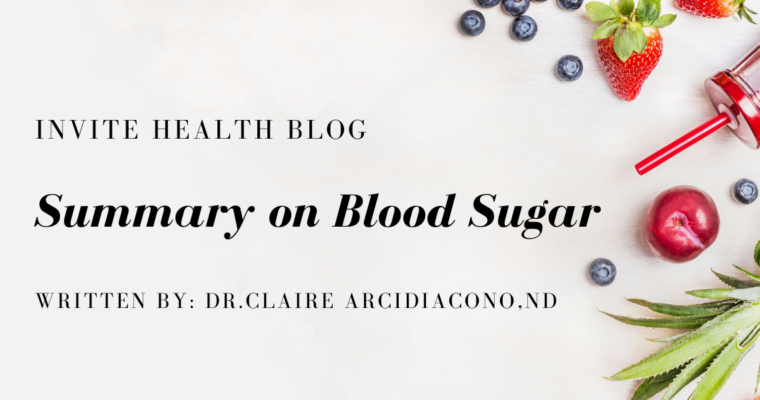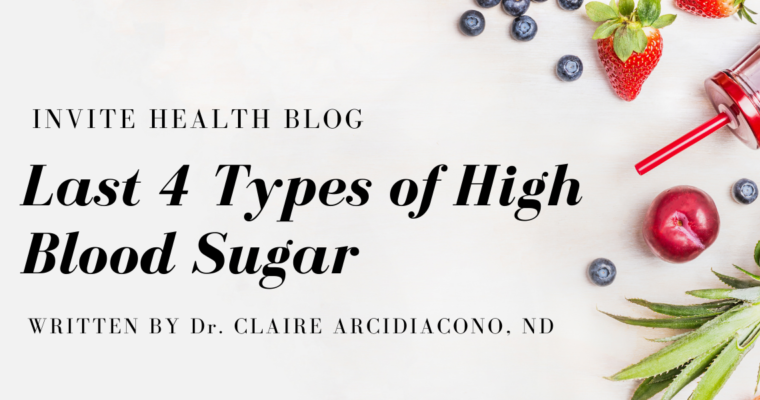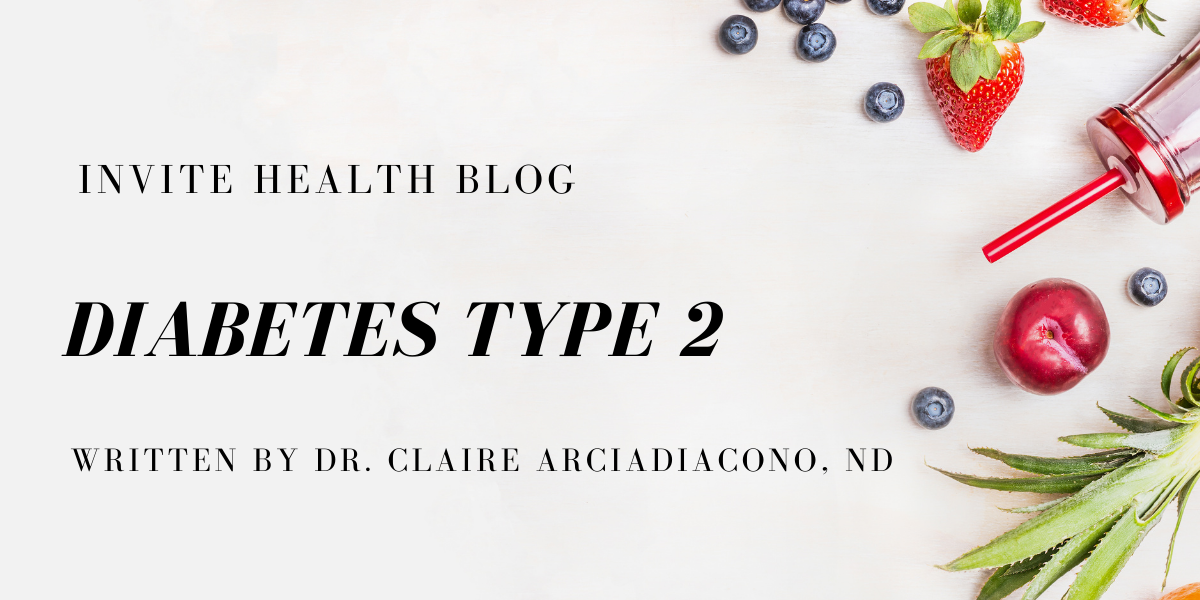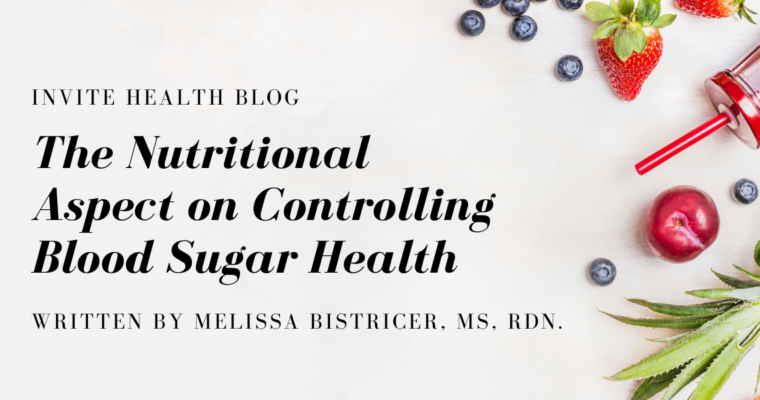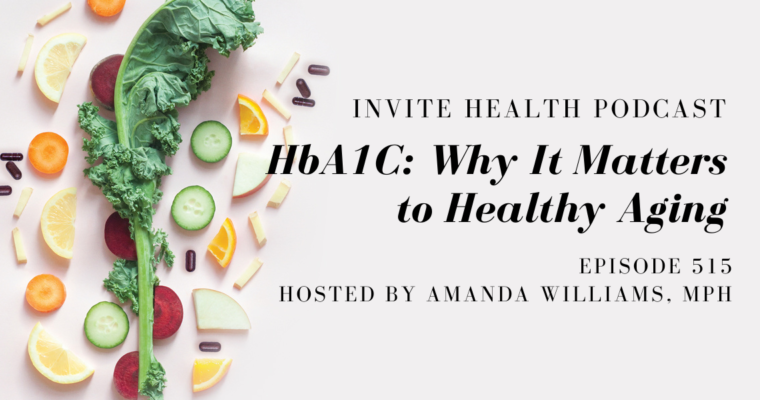Written by Dr. Claire Arcidiacono, ND
For further questions or concerns email me at [email protected]†

Last week we talked about prediabetes. While not all people with diabetes type 2 first present with prediabetes, in my clinical experience many people do. Likewise while not everyone with prediabetes becomes a type 2 diabetic, it is very common. Type 2 diabetes is also known as adult onset diabetes or non-insulin dependent diabetes. With diabetes type 2 the muscles, liver, and fat tissue develop insulin resistance. To compensate for this insulin resistance there is an increase of insulin production by the beta cells (If you want to refresh your memory check out my former blog). However in the long run, the beta cells start to “burn out” and less insulin is actually made. Basically the high blood sugar of diabetes occurs due to a combination of insulin resistance and reduced insulin production. (1) Now if you remember way back when we talked about type 1 diabetes this might sound familiar however in type 1 there is no insulin produced unlike in type 2 where it is still being produced.
ICYMI:THE PHYSIOLOGY OF DIABETES>>READ NOW!
The symptoms of diabetes type 2 are going to sound very familiar to last week since prediabetes is basically prediabetes type 2. To start with there is high blood sugar. Blood tests for type 2 diabetes include an A1C of greater than or equal to 6.5. A consistent reading of fasting blood sugar over 126 can indicate a need to have your A1C checked. Please see the attached chart for the WHO criteria. (2)
WHO diabetes diagnostic criteria
COMMON SYMPTOMS
Common symptoms that are easily noticed include increased thirst, frequent urination, and an increase in hunger with weight loss rather than weight gain. Other symptoms can include blurry vision, fatigue and recurrent infections. Peripheral neuropathy can also develop as well as a loss of taste. Lastly there may be itchiness. (3)
RISK FACTORS
The most important risk factor for diabetes type 2 is lifestyle and genetics. Excess body fat is associated with 30% of type 2 diabetes in those of Chinese and Japanese descent, 60-80% of those of European and African descent and 100% of Pima Indians and Pacific Islanders. (4) In addition to obesity a lack of physical activity, stress and poor sleep patterns are also risk factors. Smoking is also a risk factor for diabetes. (5) Poor diet is also such a huge risk factor that I can’t stress it enough! So many studies show that sugar sweetened drinks are a risk factor for type 2 diabetes. I’d like to say yes fruit juice is a sugar sweetened beverage and nope mixing it with water doesn’t reduce the effect of the sugar. (6) A diet high in white foods such as white rice appears to also increase risk of type 2 diabetes. Additionally saturated fats and Trans fats can increase the risk of type 2 diabetes. (7) While it appears that up to 72% of type 2 diabetes is inherited it is a complex set of more than 36 genes that contributes to the risk of diabetes. Much more research is needed on this topic. (8) Other medical conditions that increase the risk of type 2 diabetes include a history of gestational diabetes, acromegaly, Cushing’s disease, hyperthyroidism, Pheochromocytoma, eating disorders and certain cancers. (9) Lastly certain medications such as Glucocorticoids , thiazides, beta blockers, atypical Antipsychotics and statins can also increase diabetes risk. (10)
- There are a number of complications caused by diabetes. First is that the type 2 diabetes is associated with a 10 year shorter life expectancy. There is 2-4 times the risk of cardiovascular disease, for example heart attack or stroke. There is a 20 fold increase in lower limb amputations. (11) Type 2 diabetes is the largest cause of kidney failure and non-traumatic blindness in the developed world. Diabetes type 2 is also associated with dementia such as Alzheimer disease and vascular dementia. Other complications include sexual dysfunction and increased infections as well as changes in skin pigmentation. Lastly there is an association with diabetes and hearing loss. (12)
SUPPLEMENTS
There are many supplements that can help with managing type 2 diabetes!
- Berberine has been found to lower A1c in studies! (13) This item is available by special request.
- Cinnamon has been found in studies to help lower blood sugar that spikes after eating. (14). Please seen Invite’s C-Betics!
- Chromium, Zinc and Magnesium have been correlated with better blood sugar control. Studies show that those with low levels of these nutrients have less stable or even poorly controlled blood sugar. (15) Please see Invite health for all of our options containing these fantastic nutrients!
- Gymnema is one of the herbal remedies that studies have found to be anti- diabetic and to help with normalizing blood sugar. (16) Please see Invite’s Gluco Hx for this amazing herb!
- Bitter melon has been found in studies as well as through traditional medicine to be very helpful at regulating blood sugar levels. (17) Please see Invite’s Gluco Hx for this amazing herb!
- Vanadium is a mineral found to help with insulin sensitivity in studies (18). Please see Invite’s Gluco Hx for this amazing herb!
- Grape seed has been found in studies to help keep blood sugar in a normal range. (19) See Invite’s Grape seed extract!
- To substitute for sugary beverages Invite has a fantastic line of powders! Try our Reds, Oranges, Purples or even our Organic greens for a great juice replacement.
- In that same line if your craving a hot chocolate, Cocoa Hx is a safe powder that is full of benefits that tastes fantastic as a hot chocolate!
DIABETICS SHOULD KNOW THIS SUPPLEMENT – INVITE HEALTH PODCAST, EPISODE 558>>LISTEN NOW!
Next week is the interesting topic of Metabolic syndrome!
SOURCES
- Sun T, Han X (2019). “Death versus dedifferentiation: The molecular bases of beta cell mass reduction in type 2 diabetes”. Seminars in Cell and Developmental Biology. 103: 76–82. doi:10.1016/j.semcdb.2019.12.002. PMID 31831356. S2CID 209341381.
- Definition and diagnosis of diabetes mellitus and intermediate hyperglycemia: Report of a WHO/IDF consultation (PDF). Geneva: World Health Organization. 2006. p. 21. ISBN 978-92-4-159493-6.
- “Diagnosis of Diabetes and Prediabetes”. National Institute of Diabetes and Digestive and Kidney Diseases. June 2014. Archived from the original on 6 March 2016. Retrieved 10 February 2016to clinical endocrinology (9th ed.). New York: McGraw-Hill Medical. ISBN 978-0-07-162243-1. OCLC 613429053.
- Touma C, Pannain S (August 2011). “Does lack of sleep cause diabetes?”. Cleveland Clinic Journal of Medicine. 78 (8): 549–58. doi:10.3949/ccjm.78a.10165. PMID 21807927. S2CID 45708828.
- Malik VS, Popkin BM, Bray GA, Després JP, Hu FB (March 2010). “Sugar-sweetened beverages, obesity, type 2 diabetes mellitus, and cardiovascular disease risk”. Circulation. 121 (11): 1356–64. doi:10.1161/CIRCULATIONAHA.109.876185. PMC 2862465. PMID 20308626.
- Risérus U, Willett WC, Hu FB (January 2009). “Dietary fats and prevention of type 2 diabetes”. Progress in Lipid Research. 48 (1): 44–51. doi:10.1016/j.plipres.2008.10.002. PMC 2654180. PMID 19032965.
- Melmed S, Polonsky KS, Larsen PR, Kronenberg HM, eds. (2011). Williams textbook of endocrinology (12th ed.). Philadelphia: Elsevier/Saunders. pp. 1371–1435. ISBN 978-1-4377-0324-5.
- Funnell MM, Anderson RM (2008). “Influencing self-management: from compliance to collaboration”. In Bethel MN, Feinglos MA (eds.). Type 2 diabetes mellitus: an evidence-based approach to practical management. Contemporary endocrinology. Totowa, NJ: Humana Press. p. 462. ISBN 978-1-58829-794-5. OCLC 261324723.
- Izzedine H, Launay-Vacher V, Deybach C, Bourry E, Barrou B, Deray G (November 2005). “Drug-induced diabetes mellitus”. Expert Opinion on Drug Safety. 4 (6): 1097–1109. doi:10.1517/147403
- Melmed S, Polonsky KS, Larsen PR, Kronenberg HM, eds. (2011). Williams textbook of endocrinology (12th ed.). Philadelphia: Elsevier/Saunders. pp. 1371–1435. ISBN 978-1-4377-0324-5.
- Ripsin CM, Kang H, Urban RJ (January 2009). “Management of blood glucose in type 2 diabetes mellitus”. American Family Physician. 79 (1): 29–36. PMID 19145963.
- https://www.ncbi.nlm.nih.gov/pmc/articles/PMC2410097/
- https://www.ncbi.nlm.nih.gov/pmc/articles/PMC6425402/
- https://pubmed.ncbi.nlm.nih.gov/26406393/
- https://www.ncbi.nlm.nih.gov/pmc/articles/PMC4027280/
- https://www.ncbi.nlm.nih.gov/pmc/articles/PMC4591578/
- https://pubmed.ncbi.nlm.nih.gov/9823013/
- https://pubmed.ncbi.nlm.nih.gov/pcm/articles/34466453
- https://www.ncbi.nlm.nih.gov/pmc/articles/PMC3466453/


